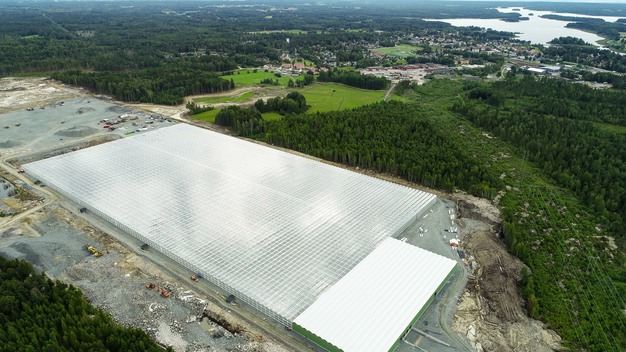WA3RM and then municipality of Boden, Sweden, in co-operation - investigating the possibility of large-scale food production using residual heat from the planned steel mill. WA3RM and Boden Business Park have started a collaboration to explore the possibilities of industrial symbiosis when the large steel mill investment in Boden is realized. The idea is to build greenhouses that utilize the large amounts of residual flows that arise.
Boden, in the far north of Sweden, already has a pilot plant for year-round greenhouse cultivation using residual heat from a data centre.

"It's incredibly big and very exciting! For the past two years we have been working with a demo greenhouse heated by residual heat to see how it could work in our Arctic climate and the results have been positive. Now we are trying to create the conditions for actors to implement such a venture on an even larger scale", says Nils Lindh, business developer at Boden Business Park, who together with representatives from Bodens Energi and the County Administrative Board of Norrbotten recently visited Regenergy Frövi, WA3RM's first development project for tomato cultivation in greenhouses.
The grower FoodVentures will soon plant 250 000 tomato plants in the 10-hectare greenhouse in Frövi and produce 8 000 tonnes of tomatoes each year using residual heat from a nearby cardboard mill. This corresponds to about one tenth of the current Swedish consumption of tomatoes, over 80% of which are currently imported.
"A sustainable food system is crucial for humanity in many ways. While it is vital that everyone has access to healthy food, the current food system is one of the main causes of climate change, biodiversity loss, and negative impacts on water and soil. The pandemic and now the war in Ukraine have brought these issues to the fore-front. Large-scale food production in a sustainable circular symbiosis using residual heat can be an important piece of the puzzle in creating a sustainable food system with increased self-sufficiency,' says Sara Watz, strategic coordinator for the food industry of the future at Boden Business Park.
"The major industrial investments now being made in Boden, as part of the green transition, will generate large amounts of residual heat and it opens up exciting opportunities to create new businesses that contribute to creating a more circular and sustainable society, says Roger Hansson, responsible for WA3RM's project development in northern Sweden.
WA3RM
Jacques Ejlerskov, CEO WA3RM
+45 27 12 54 66
[email protected]
wa3rm.com
